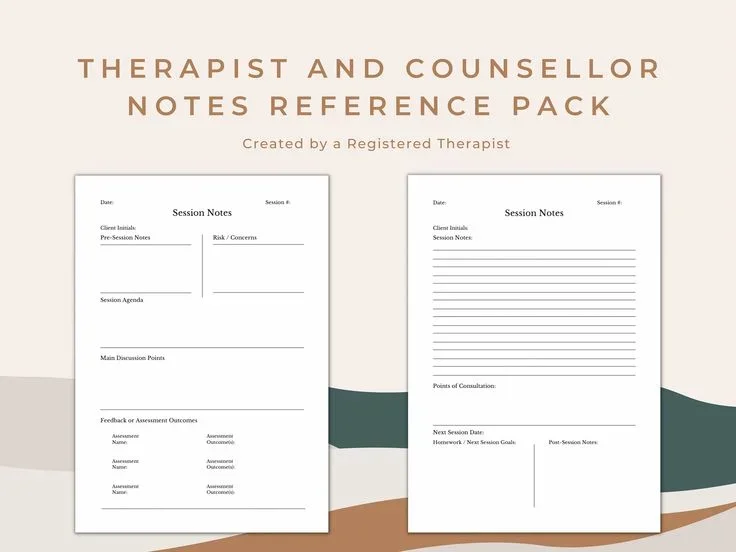Navigating the complexities of therapy notes requires a robust and responsive customer service system, ensuring smooth communication and timely access to critical information.
Effective therapy notes customer service is paramount for maintaining the integrity and confidentiality of sensitive patient data, fostering trust between practitioners and their clients, and streamlining administrative processes.
This intricate system, encompassing a range of services from secure document access to efficient scheduling for client consultations, directly impacts the overall quality of care and the experience for all involved.
The handling of therapy notes, a crucial component of the therapeutic process, must prioritize secure data management, quick retrieval of essential documents, and personalized support for clients and practitioners alike.
Understanding the nuances of therapy notes customer service is critical for ensuring accurate records are readily available to therapists, facilitating effective treatment plans and fostering a positive therapeutic environment.
The sensitive nature of these notes makes prompt and reliable customer service essential to upholding ethical guidelines and maintaining patient privacy.
A well-designed therapy notes customer service system, built on a foundation of accessibility, security, and excellent support, benefits everyone in the therapeutic community.
By streamlining the processes of note review, amendment, and dissemination, a high-quality therapy notes customer service function improves efficiency and allows therapists to concentrate on providing optimal care.
Effective Therapy Notes Customer Service: A Cornerstone of Patient Care
A robust therapy notes customer service system is essential for streamlining the access and management of sensitive patient information, safeguarding confidentiality, and ensuring the smooth operation of a therapy practice.
Efficient handling of therapy notes is crucial for maintaining patient trust and promoting a positive therapeutic experience. This encompasses the ability to securely access, retrieve, and share critical documentation while adhering to strict privacy protocols.
This dedicated customer service approach goes beyond simply providing access to therapy notes. It includes personalized support for practitioners and clients, helping them navigate the system and utilize the tools effectively.
A well-designed therapy notes customer service framework directly impacts the quality of care provided. Accessible and secure notes facilitate timely and accurate communication between clinicians and patients, supporting the therapeutic process.
Furthermore, an effective customer service system must include clear procedures for requesting and receiving therapy notes, ensuring compliance with all relevant regulations and maintaining the integrity of patient data.
The system’s design should anticipate potential issues or requests and provide clear guidance and support for both clinicians and patients in accessing and interpreting the information contained within therapy notes. This proactive approach reduces misunderstandings and promotes a collaborative therapeutic environment.
Ultimately, a superior therapy notes customer service platform not only facilitates efficient note management but also fosters a more harmonious relationship between all stakeholders in the therapeutic process.
Effective Therapy Notes Customer Service: A Cornerstone of Patient Care
A comprehensive therapy notes customer service strategy is pivotal for managing patient information efficiently and safeguarding sensitive data.
This system must prioritize secure access to therapy notes, facilitating timely retrieval of vital information while maintaining strict confidentiality protocols.
The system’s design should consider the needs of both practitioners and clients, ensuring seamless interaction and a positive user experience.
Reliable access to therapy notes is essential for facilitating ongoing treatment and ensuring continuity of care.
This access must be secure, adhering to the highest privacy standards and regulations, thereby protecting sensitive patient data.
A robust therapy notes customer service system should incorporate features that support the practitioner’s workflow by providing swift and reliable access to client records.
Client-centered functionalities, including the ability to request specific information and access their therapy notes, are crucial for fostering trust and empowering clients in their treatment.
Effective customer service mechanisms, like clear communication channels and prompt responses to inquiries, reduce administrative burden and enhance the overall satisfaction of all stakeholders.
The security features of the therapy notes system should include robust authentication protocols, encryption, and access controls.
Streamlining the process for requesting revisions or clarifications to therapy notes is critical to maintaining accuracy and minimizing potential errors.
A dedicated help desk or support team can offer tailored assistance to practitioners and clients, addressing any technical difficulties or questions regarding the system.
Regular training and updates for all users are necessary to ensure proficiency and familiarity with the therapy notes system.
This approach should involve training on proper documentation procedures, emphasizing the importance of accurate and thorough notes.
The system must facilitate secure communication between clients and practitioners, supporting the ongoing therapeutic relationship.
A critical component is the integration of the therapy notes system with other relevant platforms, such as electronic health records (EHR) systems, to optimize workflow and ensure data consistency.
The design should accommodate various needs and preferences of clients and practitioners, such as different note-taking styles, record retrieval preferences, and communication protocols.
A well-maintained therapy notes system can streamline administrative tasks, allowing practitioners more time to dedicate to their clients’ care.
This comprehensive approach to therapy notes customer service is not just a technical solution; it is a strategic investment in the quality of patient care and the overall efficacy of the therapeutic process. It directly impacts client satisfaction and the ability of practitioners to deliver effective, evidence-based treatment.
Third H2: Maintaining Client Confidentiality in Therapy Notes Customer Service
Client confidentiality is paramount in therapy note management, and a strong customer service approach must prioritize this sensitive aspect.
Effective therapy notes customer service necessitates a deep understanding and strict adherence to privacy regulations like HIPAA (Health Insurance Portability and Accountability Act) in the US, or equivalent regulations in other jurisdictions. This involves protecting client information from unauthorized access, both online and offline.
Maintaining client confidentiality in therapy notes customer service involves implementing robust security measures that safeguard sensitive data. This includes access controls, encryption protocols, and secure storage methods for all therapy notes.
A key aspect of customer service in this context is accurately communicating the policies and procedures surrounding therapy note access to the user. This includes clearly outlining who can access notes, what information is accessible, and under what circumstances access can be granted.
Clear communication is crucial to address any client concerns or questions about their confidentiality. Customer service representatives need to clearly and professionally explain the procedures for requesting access to therapy notes and the process for handling any perceived breaches or violations of client privacy.
Training customer service personnel to recognize and handle potential privacy breaches is essential for ensuring client safety and complying with legal requirements. This training must cover the proper procedures for reporting and escalating concerns to the appropriate individuals within the organization.
A dedicated customer service team focused on therapy notes should be able to provide prompt responses to client inquiries regarding confidentiality and access rights. This proactive approach reduces client anxiety and builds trust, thus promoting a positive experience.
Adherence to confidentiality protocols in therapy notes customer service is not merely a legal obligation; it’s a fundamental aspect of ethical practice. It demonstrates respect for clients and fosters a safe and supportive therapeutic environment.
Providing clear and comprehensive information on therapy note access procedures and confidentiality policies strengthens the trust between clients and the service provider. This also aids in building the reputation of the service as one that values client privacy and is dedicated to upholding the highest standards of care.
In summary, effective therapy notes customer service requires a dedicated focus on upholding client confidentiality. This includes robust security measures, clear communication regarding access policies, and comprehensive training for customer service personnel. By prioritizing client privacy in all aspects of therapy note management, the organization demonstrates respect and trust for its clientele, ensuring their well-being and adherence to legal requirements.
Protecting Client Confidentiality in Therapy Notes Customer Service
Maintaining the confidentiality of therapy notes is paramount in providing ethical and effective customer service within the mental health field.
This crucial aspect of customer service ensures that sensitive information shared during therapy sessions remains protected from unauthorized access and use.
The meticulous handling of therapy notes, from initial intake to final sessions, is vital in upholding client trust and promoting a safe therapeutic environment.
Strict adherence to privacy regulations, such as HIPAA in the United States, is essential for responsible therapy notes customer service.
These regulations dictate how therapy notes must be stored, accessed, and transmitted, minimizing the risk of breaches and protecting the client’s personal information.
Properly securing electronic health records (EHRs) containing therapy notes is equally critical in today’s digital landscape.
Robust password protection, access controls, and encryption safeguards are necessary measures to prevent unauthorized access to client data.
Furthermore, limiting physical access to paper-based therapy notes in secured locations is crucial for safeguarding confidentiality.
Transparent communication with clients about their rights regarding their therapy notes is vital for fostering trust and maintaining a positive therapeutic relationship.
Therapy notes customer service professionals must clearly outline policies regarding the use and disclosure of client information, ensuring clients are fully informed about the procedures in place.
This transparent approach fosters client confidence and demonstrates a commitment to responsible handling of their personal data.
Practitioners should adhere to strict ethical guidelines and be meticulous in their handling of therapy notes, prioritizing the client’s well-being above all else.
By prioritizing confidentiality, therapy notes customer service departments create a safe and supportive environment where clients feel comfortable sharing their experiences.
Implementing these protective measures demonstrates a commitment to ethical practice and ensures compliance with relevant regulations.
In conclusion, effective therapy notes customer service is paramount to maintaining the integrity and accessibility of crucial clinical records.
This article has highlighted the importance of prompt responses, accurate information, and clear communication channels when handling requests for therapy notes.
From a patient perspective, seamless access to their therapy notes empowers informed decision-making, facilitates ongoing care, and fosters a stronger therapeutic alliance.
For clinicians, efficient therapy notes customer service streamlines administrative tasks, ensures compliance with regulations (like HIPAA), and reduces potential legal and ethical concerns.
Ultimately, prioritizing customer service in the handling of therapy notes reflects a commitment to ethical practice and a dedication to supporting both patients and practitioners in navigating the complexities of mental health care. Excellent therapy notes customer service is not just a logistical necessity; it is a fundamental component of high-quality patient care. Properly managing requests for therapy notes demonstrates a practice’s respect for patient privacy and promotes the therapeutic process by allowing patients access to their clinical information when needed. This aspect of patient care should be approached with the same diligence and care that characterizes the therapeutic process itself. Consequently, building a system for seamless and efficient therapy notes customer service is a key aspect of building trust and fostering the growth of a healthy professional relationship.




